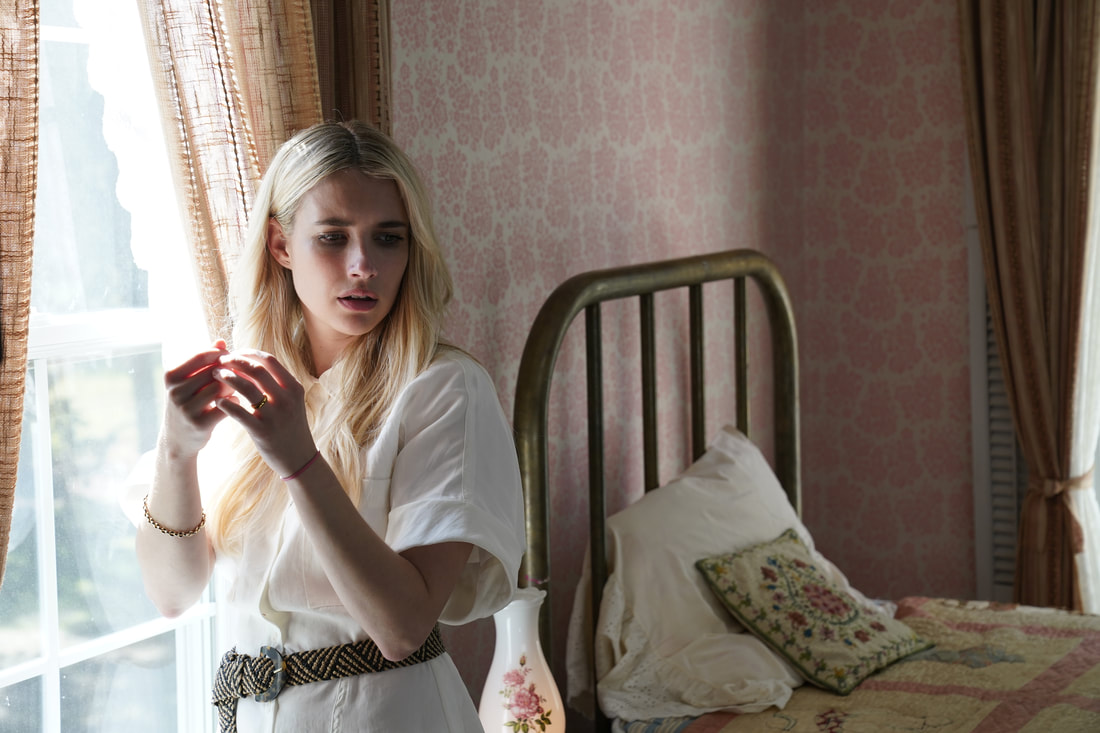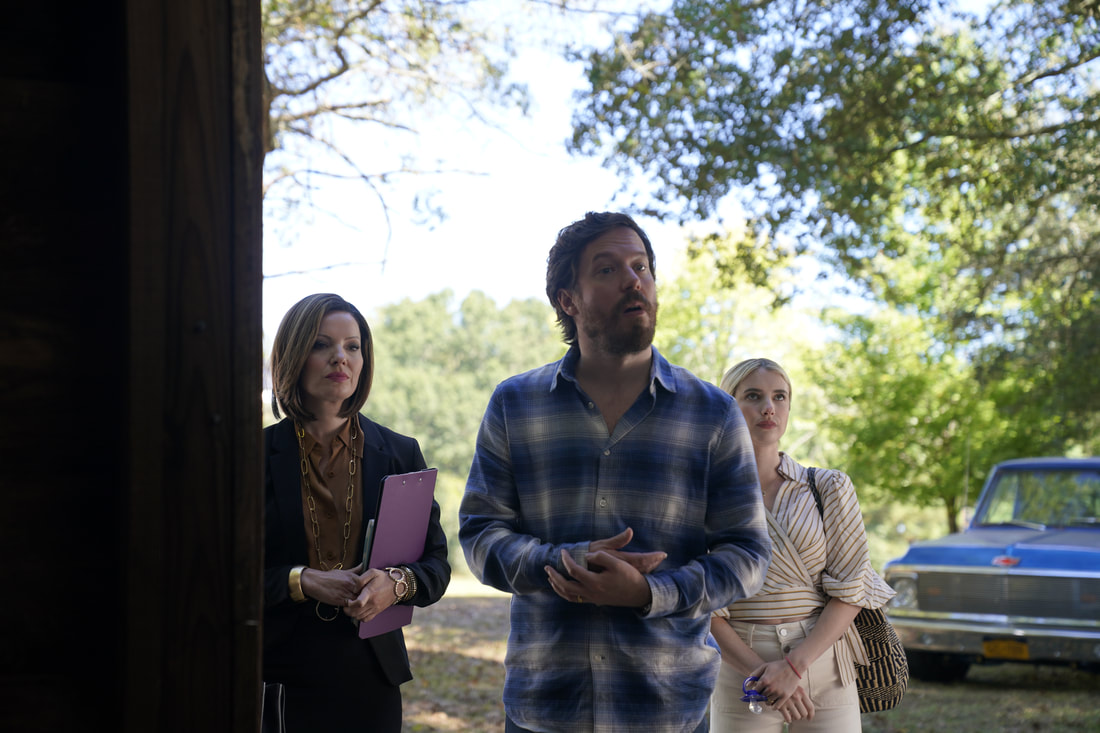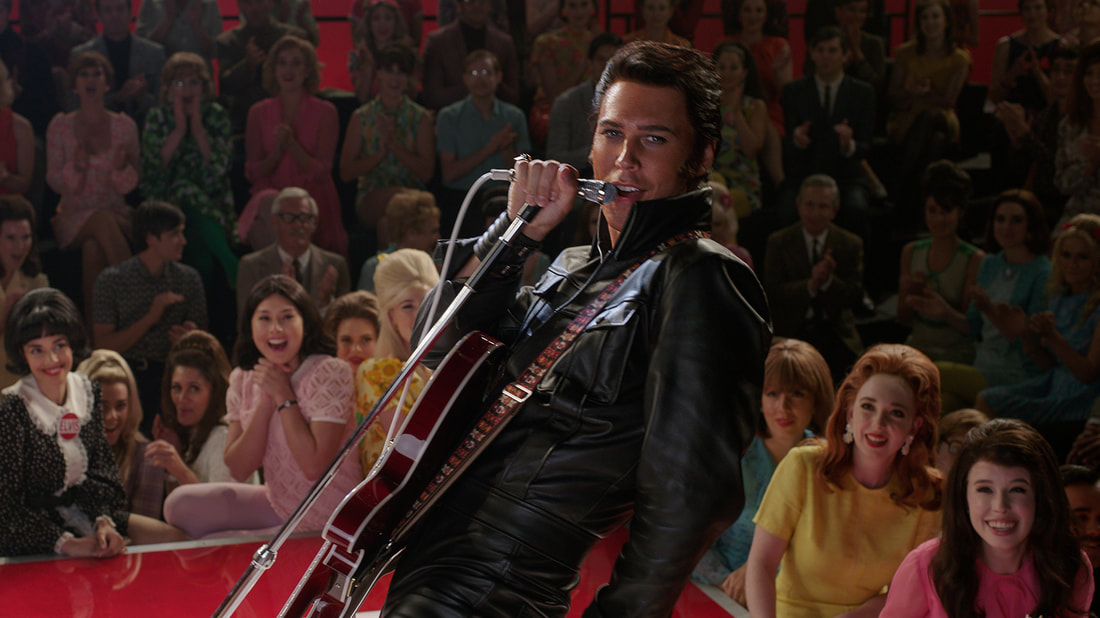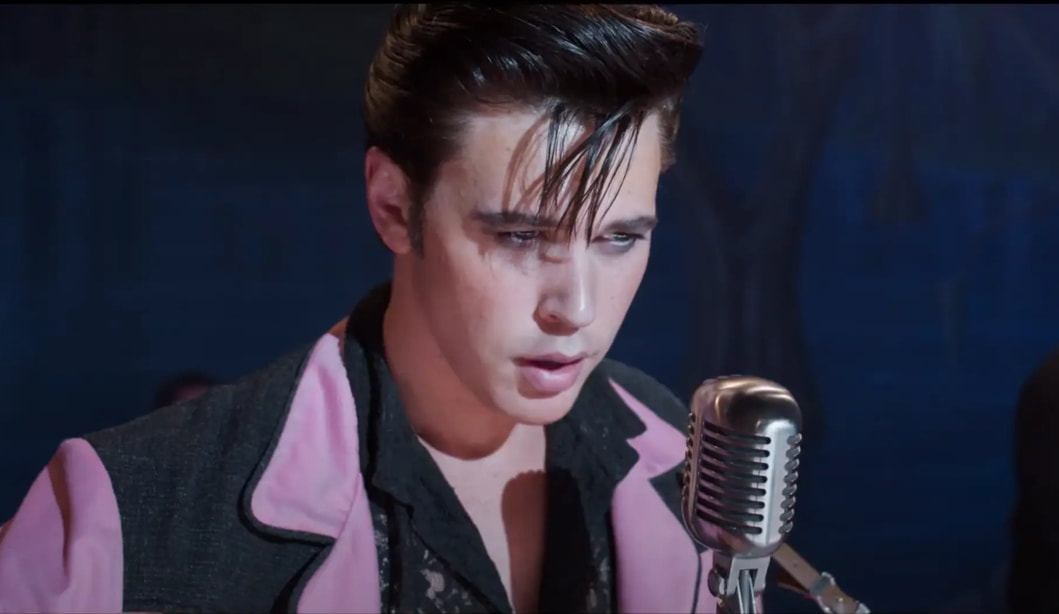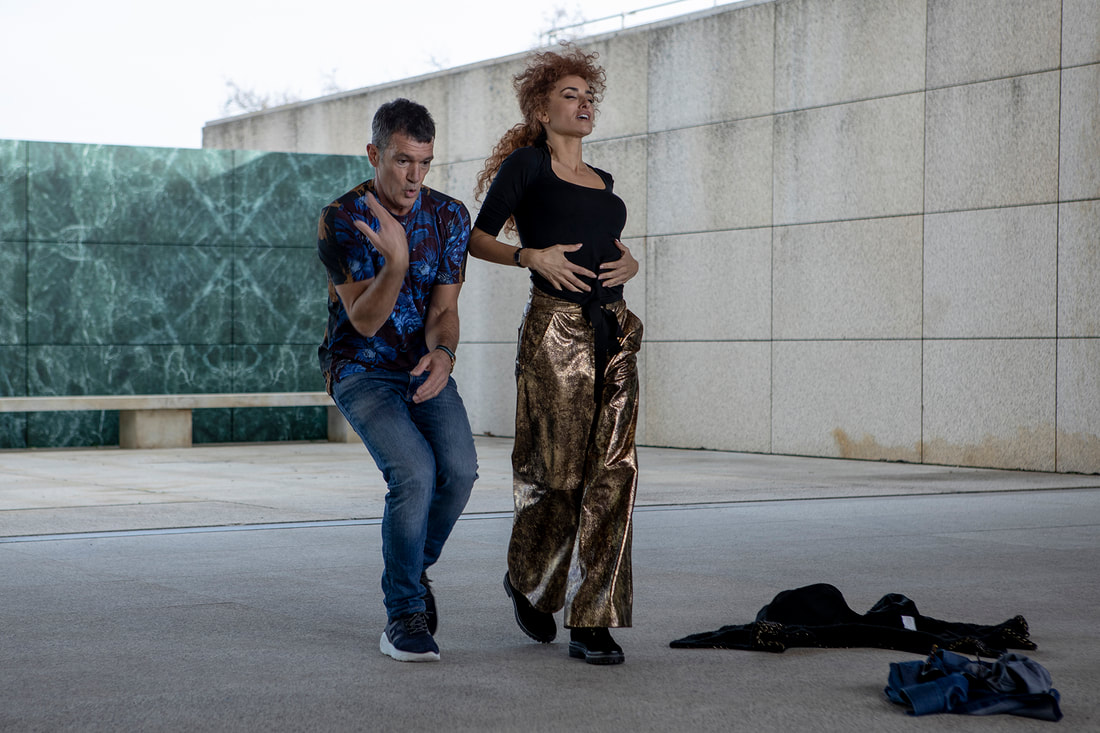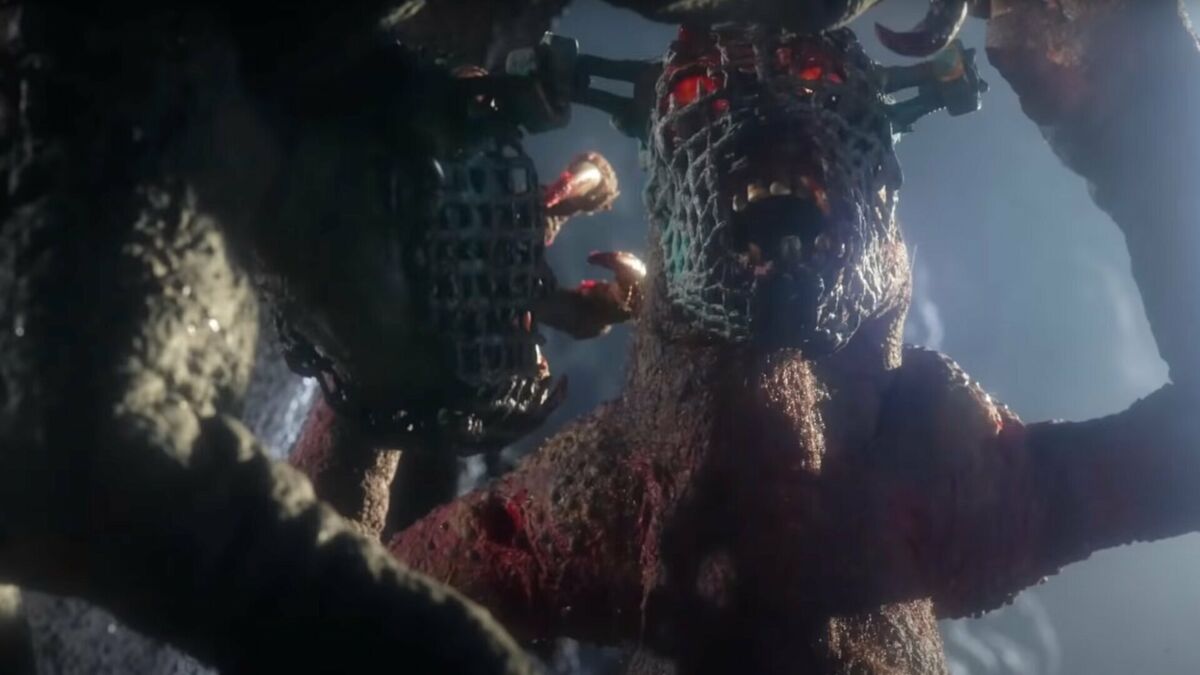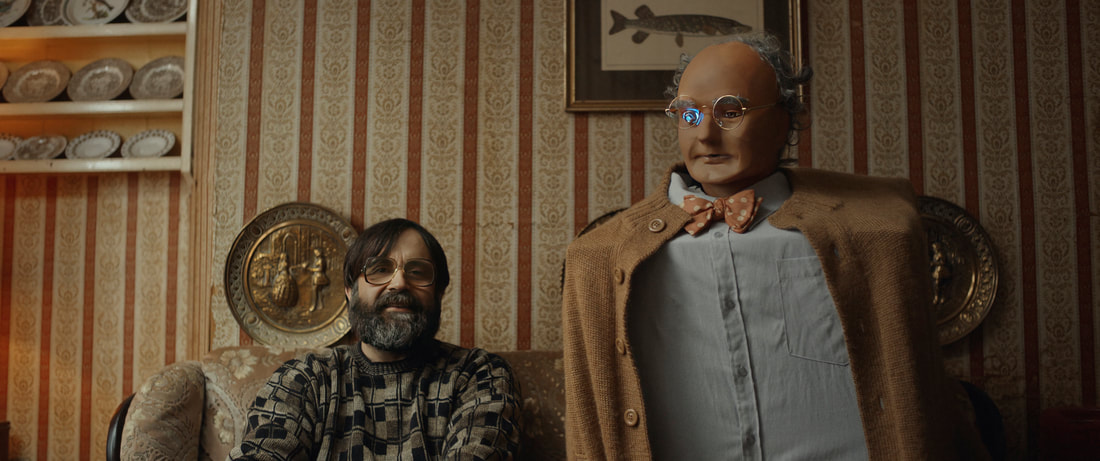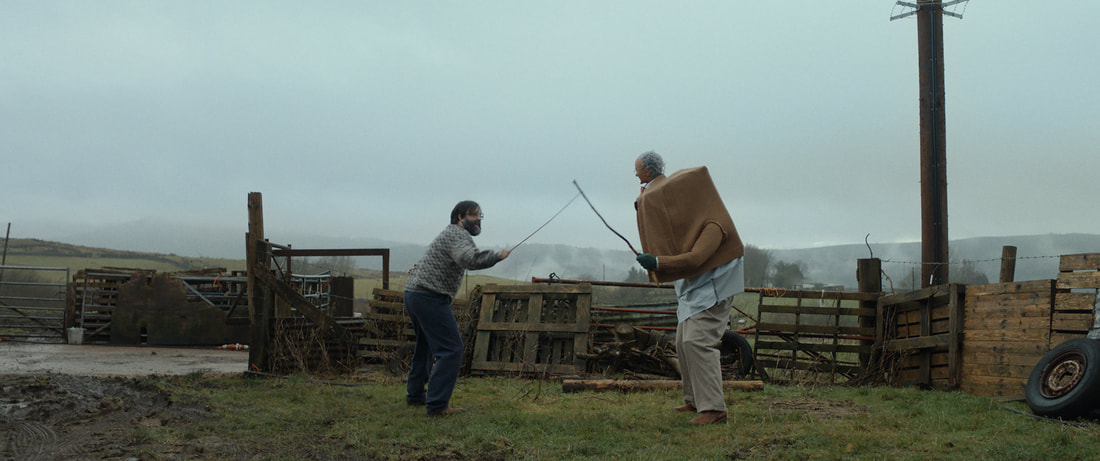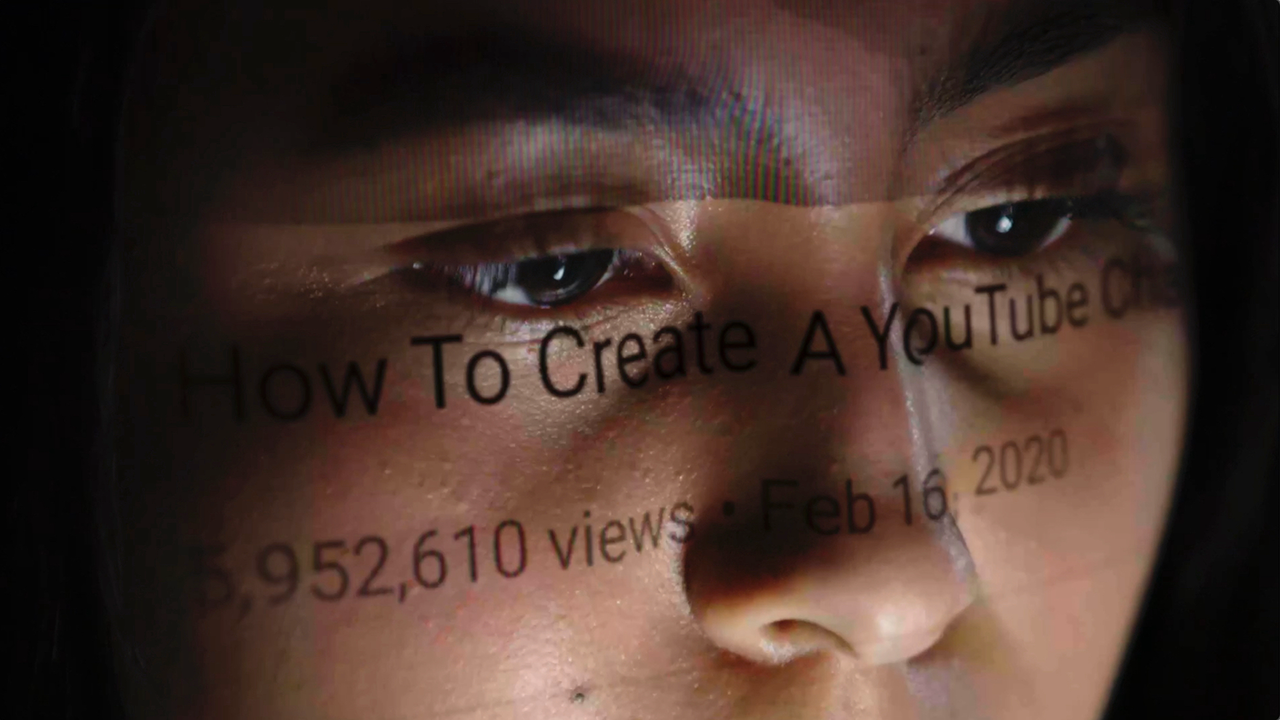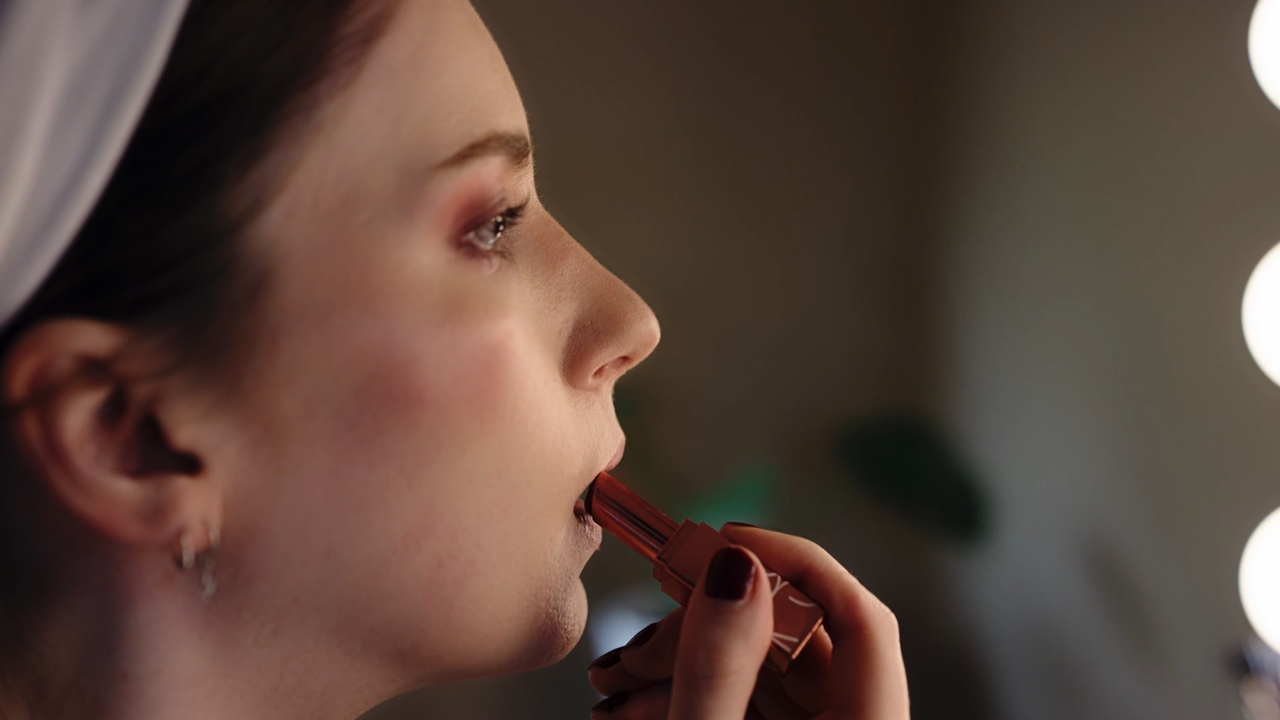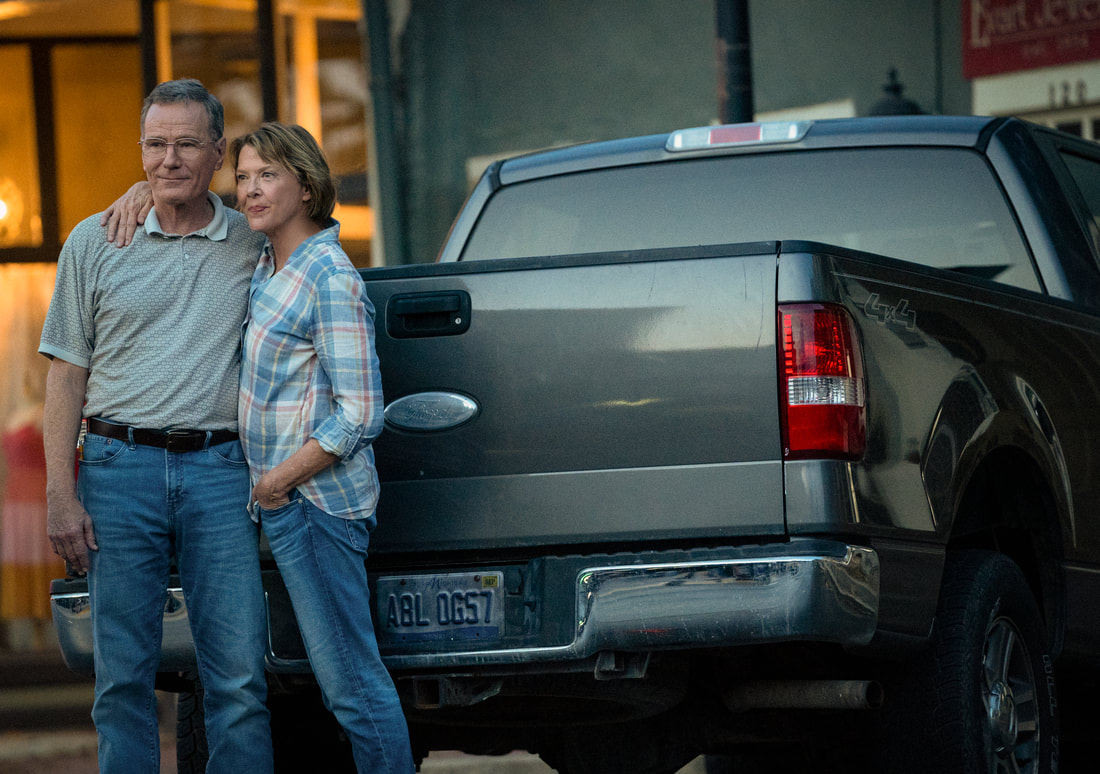|
Review by Sean Boelman
When one thinks about documentaries focusing on the recording of a specific album, it’s often in connection to a band that they are already a fan of. Stay Prayed Up doesn’t really have the crutch of an enthusiastic fanbase to fall back on — instead, it tries (mostly successfully) to explore the universal power of its subject’s voice.
The film follows Lena Mae Perry and her gospel group, The Branchettes, as they record their first-ever live album. Within the gospel community, Perry and The Branchettes are legendary, and their impact on Black gospel music is profund, but their names are likely to be unfamiliar to anyone who doesn’t follow that genre of music. Like the similar movie Amazing Grace that came out a few years back, this film tries to capture the power of a religious experience in a documentary. And while Mrs. Perry’s voice is undeniably amazing, this movie doesn’t have the benefit of having one of the most iconic singers of all time at its helm. The film does benefit from its characterization — letting us get to know Perry and The Branchettes outside of their live recording sessions allows us a glimpse into why their music speaks to them personally. It gives the movie that added touch of humanity that goes a long way in connecting audiences who might not get the appeal of gospel music to the story.
Indeed, we spend so much of the film seeing these people go through what is apparently a genuine religious experience, but simply observing this recording session probably isn’t going to be enough for most audiences. There is no denying that we are watching something special occur, but how that translates to the viewer from afar is less clear.
Thankfully, the movie doesn’t take an overly preachy perspective. Even though there is a heavy religious connotation to all of the music featured in the film, it never feels as if we are simply watching a sermon. But for those audiences who are more religious, this somewhat distant approach to gospel music might be a turn-off. The ways in which the movie was shot also could have been improved. There is so much energy in this room, and that directors D.L. Anderson and Matthew Durning weren’t always able to capture that is disappointing. They shot the recording in a shockingly straightforward manner, and the result almost feels too academic. There are certainly some good things about Stay Prayed Up, but for the most part, it’s rather unaffecting. It’s not a poorly-made film by any means, and it’s interesting enough, although for a movie that lives or dies by its power, leaving the audience unstirred feels like a disappointment. Stay Prayed Up is now in theaters and hits VOD on July 5. Rating: 3/5
0 Comments
Review by Adam Donato Abandoned is the first feature film from actor Spencer Squire. Good for him getting a cast of known players such as Emma Roberts, Michael Shannon, and John Gallagher Jr. Squire had worked with Shannon previously, which might have been the connection. Roberts plays a woman who is struggling with postpartum depression. Gallagher Jr. plays her husband who moves with her to an old farmhouse. The couple is somewhat turned off to the house after hearing about the double homicide and suicide that took place with the previous owners by a mother very similar to Roberts. The horrors she experiences are personified by this haunted house in this horror thriller movie. Can she find peace with her new life or will she succumb to madness? Not unlike Monstrous from earlier this year, Abandoned feels derivative of other horror movies. A woman struggles with her past trauma and her life is turned into a nonstop horror barrage. Speaking of horror, this movie is not very scary at all. Most of the scares are surrounded by flies. They’re always buzzing around her and surrounding disgusting things she finds in the house. There’s not much of a mystery whether or not the horror is more internal or external. It’s very clear this is a personal problem for Roberts's character so the external scary scenes are underwhelming to say the least. It’s nice to focus on the internal conflict, but nothing interesting is done with it. Erick Patterson is most known for writing R.L. Stine’s The Haunting Hour series and Another Cinderella Story, so the lack of an interesting story is not surprising. The most noteworthy aspect of the movie is the cast. Roberts is no stranger to the horror genre with Scream 4 and Scream Queens. She’s pretty much the only thing holding this movie above a one star rating. Her relationship with Gallagher Jr. feels realistic. It’s depressing watching Gallagher Jr. try so desperately to make this new life work when most of the time it doesn’t feel like Roberts is on his team. Shannon is definitely in the movie. He plays their creepy neighbor who randomly shows up inside their house uninvited. Their house has personal significance to him and his relationship with Roberts helps bring her out of her funk.
Abandoned provides absolutely nothing new. It’s much more effective as a drama than it is as a horror movie. The cast adds some legitimacy to what is, in reality, a tepid experience of a movie. Roberts fans may enjoy it, but there’s not much here for other audiences. It’s more whatever bad than it is bad bad. Abandoned is now in theaters and on VOD. Rating: 2/5 Review by Camden Ferrell It has been nearly a decade since Baz Luhrmann’s last feature film, The Great Gatsby, came out. For his newest movie, he has decided to make a movie about one of the biggest names in music history. Elvis is a biopic about the King of Rock and his rise to fame and prominence. The erratic pacing and Luhrmann’s signature style may polarize some viewers, and it suffers slightly from its bloated length, but it’s a mostly enjoyable movie with a great leading performance from Austin Butler. Elvis is still one of the most famous pop culture icons decades after his death, and there’s a lot about his story that audiences might not know. In this movie, we see Elvis’ beginnings as a young boy and as an adult when his career begins to skyrocket. The movie is told from the perspective of his manager Colonel Tom Parker while he’s at the end of his life. This set up is fairly standard for a musical biopic, and its execution is where it really manages to set itself apart from other similar films. The writing of this movie is decent but nothing remarkable. Nothing in its script is particularly bad, but it can feel too safe and boilerplate to really stand out in this department. It could have also been a little more comprehensive of his life as it seemed to focus heavily on certain periods and gloss over large sections of his life and career. The thing that people will talk about most with this film is its performances. Specifically, people will talk about the leading performance from Austin Butler. In his first major starring role, he is quite great as Elvis. I wouldn’t say it’s amazing or Oscar-worthy, but he embodies the role very well, and I suspect we’ll be seeing a lot more from him in the future. Tom Hanks plays Colonel Tom Parker, and his role is surprisingly forgettable for him, and it never really impresses.
Luhrmann’s style is definitely all over this film, and this may be good or bad news depending on who you are. The direction is what makes this film unique, and its flashiness works more than it doesn’t. As a result, the pacing is incredibly inconsistent which unexpectedly makes for a very entertaining first half. However, this problem starts working against the movie in the final half which drags significantly. At nearly three hours, Elvis could have definitely been shorter while still retaining the charm and eccentric style of Luhrmann. It may not be as comprehensive as one would expect, but Butler is fun to watch, and it definitely sets itself apart stylistically in order to compensate for a somewhat mediocre script. Elvis is in theaters June 24. Rating: 3.5/5
Review by Sean Boelman
A movie starring two of the greatest actors alive right now, Penélope Cruz and Antonio Banderas, that is itself a satire on the type of movies that they made their names on, should be an automatic win. Unfortunately, Official Competition never quite comes together and ends up feeling more pretentious than the art and artists it is trying to poke at.
The movie follows a filmmaker and two actors who get involved in behind-the-scenes drama on a film funded by a wealthy businessman. It’s an intriguing premise in a way akin to The Producers — a satirical take on the entertainment industry making fun of its pompousness — but the movie is missing the down-to-earth feel that would have been necessary to make it work. Instead, what we get is essentially a series of vignettes of a group of characters making an exaggerated “art film”. And while the movie does nail some of the issues of the industry on their head, it also falls short in other ways. Perhaps the most damning mistake the film makes is only being accessible to the people it is making fun of. Indeed, although it is understandable why the filmmakers took such an unorthodox approach to pacing the movie, it’s much harder to get absorbed in this than it should be. Even for someone who is personally invested in the world that is being satirized in the film, it’s a bit difficult to get fully absorbed in the story.
Part of the reason why the movie doesn’t work is that the characters are completely unapproachable. They are clearly meant to be caricatures of the type of people who find themselves in this sector of the industry, but in amplifying their ridiculous tendencies, they also end up eliminating their endearing qualities.
Still, even if the characters themselves aren’t very likable, the performances are top-notch. Banderas is working at full caliber here, giving a performance that is so absurd that it makes up for the script’s lack of hilarity. Cruz’s performance is much more grounded and could have been more playful, but is strong nevertheless. Directors Mariano Cohn and Gastón Duprat do a great job of making a film that is shallowly beautiful to watch. And while it is a perfect replication of the movies that it is making fun of, its shallow nature makes it feels as if the glossiness is little more than a distraction from the lack of substance. Official Competition should have been a slam dunk of a film given the concept and talent involved, but it’s unfortunately rather underwhelming. In trying to make fun of something pretentious, it ends up becoming exactly the thing it ridicules. Official Competition hits theaters on June 17. Rating: 2.5/5 Review by Camden Ferrell It’s not a secret that making stop-motion animated films is no easy task, and the immense dedication in each frame is what makes them so interesting to watch. Phil Tippet has done visual effects for iconic movies like Jurassic Park and Robocop and his feature directorial debut is Mad God, a stop-motion movie that has been in the making for many years. While the story isn’t always as cohesive as it needs to be, it’s hard not to love the passion and skill in the craft of the movie in its animation, world building, and ambition. In this movie, we see a character called The Assassin as they trek through a hellish landscape full of tortured souls and other monstrosities from the mind of Tippet. We follow this journey as The Assassin tries to complete his goal and navigate this world that is not at all what it seems. This is an interesting foundation which makes a lot of room for unique characters, lore, and world-building which is where this movie seems to thrive the most. Written by Tippet, this movie has the framework for a compelling narrative. However, the way it tries to tell its story with minimal dialogue can sometimes be an impediment or an advantage. Some ideas or plot points aren’t effectively communicated visually as opposed to verbally and that can lead the film to not feeling as coherent as it could have been. I understand that being a fully stop-motion movie, this can pose a creative and practical restriction, and I think with that in mind, the movie handles it well. Even if some elements of its story don’t always flow together, the movie does a great job of pacing itself not too slow as to lose interest, but slow enough to allow the audience to fully take in the various intricate details in this nightmare landscape. At a brief eighty minutes, this movie goes by quickly and leaves before it has a chance to overstay its welcome. However, I’d be lying if I said I wasn’t eager to see more of this highly unique world Tippet created.
The most admirable thing about this movie is how as an audience member, you can deeply feel how much love, work, and passion went into each frame. Knowing how arduous stop-motion filmmaking is, it really allows you to appreciate what you’re seeing on screen. From a technical standpoint, what Tippet and his team have done is nothing short of brilliant. It may not have the big budget look of some major stop-motion films, but it’s visually stunning and impressive nonetheless. If you’re a fan of stop-motion films or really the craft of filmmaking in general, this movie is a must-see if only for its technical achievement. The narrative doesn’t always work or convey its intentions in the most effective manner, but it’s still an interesting story that plays second fiddle to a world that is immaculate and captivating in all of its horrific splendor. Mad God is now streaming on Shudder. Rating: 3.5/5 Review by Dan Skip Allen It has become a trend lately that films use documentary-style filmmaking where the main character is being filmed, and their story unfolds as the viewer is watching it. That's part of the premise with Brian and Charles. The other aspect of the film is a Frankenstein-esque creation by the lead character, which leads to typical tropes we've seen a lot in Hollywood. Brian (David Earl) lives a solitary life at Ploxgreen Cottage, his home, which is a bit of a mess. He has books on the shelf showing him how to build things. He's a fledgling inventor and tinkerer. He likes to make gadgets and so forth. One day, he comes across a pile of junk, giving him the idea to make a robot. At first, the robot doesn't work, but eventually, it comes to life. Brian gives it the name of Charles Petrescu, voiced by Chris Wayward. This character in the film is kind of like a lot of people these days: caucasian men who live alone and have no redeeming qualities. They may possess a skill so they can work and pay their bills but are pretty depressed and lonely. They are even pretty shy and nervous around women. The lead character of Brian has a pretty good relationship with the robot Charles, similar to that of a father and son. He teaches him about life and the world. Charles learns a little bit on his own from reading books as well. This is a clear-cut Frankenstein story set in the outskirts of England. There is even a mob led by a local man who finds out about Charles and takes him for his daughters because he can. Brian is too afraid to stand up to him. These filmmakers are obviously huge Mary Shelley fans, but who isn't? Frankenstein's monster is one of the greatest literary characters in history, and it was previously adapted brilliantly by James Whale in the 1933 Universal Monsters classic, starring Boris Karloff as the monster.
Brian and Charles is a story of friendship and love to some extent. It is about a man who comes out of his shell to prove he's worth more than people give him credit. Even a local woman he is smitten with, Hazel (Louise Brealey), comes around in the end. People such as Brian need to know they are cared about even if they don't think they are. The use of the Frankenstein story is, in some sense, a metaphor for life. And we don't need robots or make-believe friends to prove we are worth more in life. This film is competently helmed by Jim Archer, and Universal/Focus Features scooped it up out of the Sundance Film Festival this past year. It looks really good, considering the backdrop it takes place in. I feel audiences will fall in love with this little story. People can always use a feel-good story, and this is just that. Focus knows where their bread is buttered, and it's these kinds of little indie films people can get behind. Brian and Charles hits theaters on June 17. Rating: 3.5/5
Review by Cole Groth
It's hard to discuss Alex Winter's latest documentary without discussing the modern political sphere we live in. Opening up immediately to a series of nostalgic YouTube videos such as Charlie Bit My Finger and old Smosh's Pokémon parody, The YouTube Effect seems to promise a film diving into the history of YouTube and its effect on modern society. However, throughout the 92-minute runtime, Winter chases after so many different avenues that it sometimes feels very unsatisfying. The fascinating journey he takes us on ultimately seems better suited as a miniseries than a simple documentary.
The story of YouTube is incredibly intriguing because the rise of this massive force in our society has so many interesting turns. Winter can very effectively take us on a trip down memory lane as he chooses some of the most important videos in the last two decades to represent how we've changed as a society. Tackling this website's impact on the history of the internet is a daunting task, and he manages to adequately encapsulate how it all started. However, this foundation doesn't quite hold up as the story progresses. When deciding on which of YouTube's effects to focus on, Winter chose three: YouTube's predatory monetization practices, the global community it has created, and the role it plays in fostering alt-right growth. With each branch, the documentary's structure becomes more tenuous, and by the end, it's hard to see exactly how YouTube relates to events like January 6th and PizzaGate. It seems like Winter wanted to make two separate films about YouTube and the post-2016 political landscape, but halfway through, he decided to combine the two. Some of the wild political conspiracies took shape on websites besides YouTube and thus don't seem fit for this film. His overabundance of interviews with two different YouTubers, ContraPoints and Anthony Padilla, makes the production seem amateur in many ways. With so many millions of people involved on the website, it's surprising that Winter could only get interviews with ten people. The presentation of the documentary is sleek and fascinating, but it's odd to see characters like Padilla dominate the screen for a staggering 15% of the runtime. One of the things I appreciated most about The YouTube Effect was how it made a genuine attempt, and mostly succeeded, at separating itself from the hundreds of other documentaries that, rather ironically, can be found by the millions of YouTube creators. There are so many moments that could've gone down the fear-mongering dark web route that most documentaries take, but Winter instead takes a mostly sophisticated look at how YouTube has gamed its viewers to create the multi-billion dollar behemoth it currently is. When investigating how YouTube's predatory advertising is dangerous for children, it is an effective portrait of how the algorithm is, unfortunately, able to be gamed and how quality content has been pushed to the side in favor of clickbait. This is by far the most effective avenue Winter takes, with the other two getting increasingly weaker.
The aforementioned second route analyzes how YouTube can be a force for good, demonstrating how it can connect people from backgrounds that don't find themselves typically represented and allow them to find their own community on the website. This is a pretty easy angle to approach, but Winter only interviews one or two people that speak up about this, so it seems like a wasted opportunity. It's quite a shame that he decides to focus so much energy on the third route: how YouTube unwittingly fosters the growth of the alt-right.
The biggest reason I have a problem with the film's approach to the modern political scale is that it loses focus on what the film is about. Starting with an interview with a man who says he "escaped the alt-right rabbit hole," this section of the documentary delves into how commentators on YouTube can bring people into the dark light, but I wholeheartedly dislike the angle that Winter takes. What starts first as a cautionary tale of how dangerous language can lead to events such as the tragic Christchurch mosque shooting turns into a nauseating and preachy segment about how YouTube should be used to censor creators more often. I felt like I was being beaten over the head with this messaging that more people should be kicked off for using the platform in controversial ways. I especially dislike how he portrays the events of January 6th in this film because he doesn't even try to connect YouTube with it. He shows how the event happened and how the video was used to communicate what was happening but fails to show that YouTube was responsible even in a small part. It feels like Winter wanted to show us his views on Trump's presidency and the alt-right, but he doesn't show it effectively enough in the documentary to make it seem he cared about YouTube's impact on these events. It's cool to see a film that focuses entirely on YouTube, but Alex Winter's approach to it is so wildly unfocused that it ultimately feels rather unsatisfying as a watch. It'd be much more appropriate if it took a clear focus on one of its effects rather than all of these different impacts that it's had on us as a social media platform. For many people interested in the story of YouTube, its controversial effects, and how it continues to grow, The YouTube Effect only makes it apparent that the abundance of content on YouTube would tackle these topics better than the film itself. The YouTube Effect is currently seeking distribution. Rating: 2.5/5
Review by Cole Groth
Since May of 2020, I've watched nearly a thousand films. Naturally, I've stumbled across some very strange ones. I've seen dozens, if not hundreds, of movies with bizarre plots, strange writing, confusing CGI, and utterly bizarre pacing. The Lost Girls combines all of these elements into a 107-minute train wreck of a movie, making it one of the lamest movie-watching experiences I've had in a while.
Adapted from Laurie Fox's 2003 novel, this film follows Wendy Darling Braverman (played by writer/director Livia De Paolis) on a decades-long adventure through her life. As a 13-year-old, Wendy is swept on a journey to Neverland with fairy tale legend Peter Pan (Louis Partridge), an experience she uses in her career as a writer. As she grows up, finds a husband, and has a child, she's forced to choose between her desire to revisit the love she once had and the family which she has to take care of. Where Fox was able to explore the human condition expansively, De Paolis cannot even scrape the surface of the story, making this feel like a frustratingly flightless slog. We're supposed to follow the odyssey of multiple generations of Wendy's family, but none of them have a story that's interesting enough to follow, including Wendy. Any good fantasy film uses stunning visual effects to enhance the already expansive story, and this is the department where The Lost Girls struggles the most. There are so many laughably terrible moments of bad green screen that it delves into the realm of ironic entertainment, which is only a good thing if the script can be enjoyed in a lighthearted way. It's hard to find more than a single scene without a visual effect that looks jarringly fake, and it's even harder to take these scenes seriously given the combination of the horrific script and the C-tier acting. There's an intense haze put around most of the characters in the film, which contributes to the fairy tale look at times, but at other times makes it seem like everything was shot against an ugly green screen.
De Paolis's heavy-handed script is full of strange lines such as, "I'm just an ordinary girl, I get my food at the convenience stores," or, "I enjoyed reading your book, can I have some mashed potatoes?" I found myself pausing the movie and rewinding it a few seconds to see if I missed a keyword in certain phrases, only to hear that, indeed, the lines are just poorly written. To play on the story's emotional beats, characters get incredibly angry at each other with little to no provocation. In a particularly intense dinner scene, Wendy's daughter, Berry (Ella-Rae Smith), endlessly berates her mother at the mere mention of her novel. There's very little buildup in their relationship to justify her reaction, and it instead makes Berry an unlikeable character, which seems to be an unintended effect.
From an acting standpoint, this is a very weak film. De Paolis is inadequately suited for the role of Wendy, making some of the simplest lines sound like they're being choked out in a single take. Ella-Rae Smith delivers the strongest performance, managing a demanding monologue with an impressive emotional cadence. Louis Partridge is an interesting choice for Peter Pan. He certainly looks the part and is a fairly adequate actor in his own right, although he isn't given much to work with. The other actors give consistently stilted performances with almost no genuine emotion. It's an embarrassing combination of bad acting and writing that makes the movie seem incredibly amateur. It's hard for me to find anything to praise about the film, but I genuinely enjoyed the last several minutes, not just because it was finally coming to a close, but because it was a pretty clean ending that felt satisfying enough to leave me feeling not completely disappointed. It's so hard to follow anything that was going on in the first 95 minutes or so, but the last 10 minutes make it seem clean enough not to be a total mess. You might enjoy this if you're a fan of cheesy romance, fantasy, or melodramatic films. It's an interesting concept to take a darker turn on the tale of Peter Pan, but the script isn't able to handle the breadth of the tale at all. Some moments echo the fantastical elements required to make this work, but overall this is an utterly incompetent mess of a movie. The Lost Girls releases in theaters and on VOD on June 17th. Rating: 1/5
Review by Sean Boelman
Since the COVID-19 pandemic, it has seemed that adult-oriented dramas have become a thing of the past — or at least a rarity — as multiplexes are generally either being filled with heavy-hitter franchise fare or low-risk, low-reward indies. Well, Paramount+ has come to the rescue with Jerry & Marge Go Large, a fun and wholesome film that fills a niche we haven’t seen many movies in as of late.
The film tells the story of a pair of married retirees who discover a mathematical loophole in the lottery and use the money to revive their ailing small town. And while the story of two people cheating the lottery might not sound too exciting, they did a good job of not taking too technical of an approach. The movie doesn’t waste too much time on the logistics of how the characters took advantage of the loophole, instead focusing on the human aspect of the story. Yes, the story of someone taking advantage of the lottery system is interesting, but writer Brad Copeland realizes what this actually is: the story of two people in love. One of the best things about this film is that it doesn’t blow its story out of proportion. A lot of movies that are based on stranger-than-fiction true stories like this try to turn them into something bigger than they are, but this is a contained story, and the script and direction thankfully treat it as such.
The film is effectively a showcase for its lead actors Bryan Cranston and Annete Bening. This is a particularly interesting role for Cranston, who doesn’t get much of an opportunity to flex his comedic muscles in most of his projects. His performance is tender while still nailing all of the movie’s comedic beats.
Still, the dynamic between the two characters is quite one-handed. This film is told much more from the perspective of Cranston’s character than Bening’s. For the most part, Bening’s character exists for little more reason than to be a supportive and loving wife to Cranston, which means she doesn’t get much to do. There are some other performances in the supporting cast that are of note, like Rainn Wilson’s turn as a convenience store worker who becomes their co-conspirator, and Larry Wilmore’s as the protagonists’ accountant, but the best scenes are those which feature Cranston and Bening working off of one another’s strengths. Jerry & Marge Go Large is an enjoyable, lighthearted movie aimed at older audiences, and while it might not do anything innovative, it is successful at what it sets out to do. Most people are probably going to be watching this for Bryan Cranston and Annette Bening anyway, and they are superb. Jerry & Marge Go Large streams on Paramount+ beginning June 17. Rating: 4/5
Review by Paris Jade
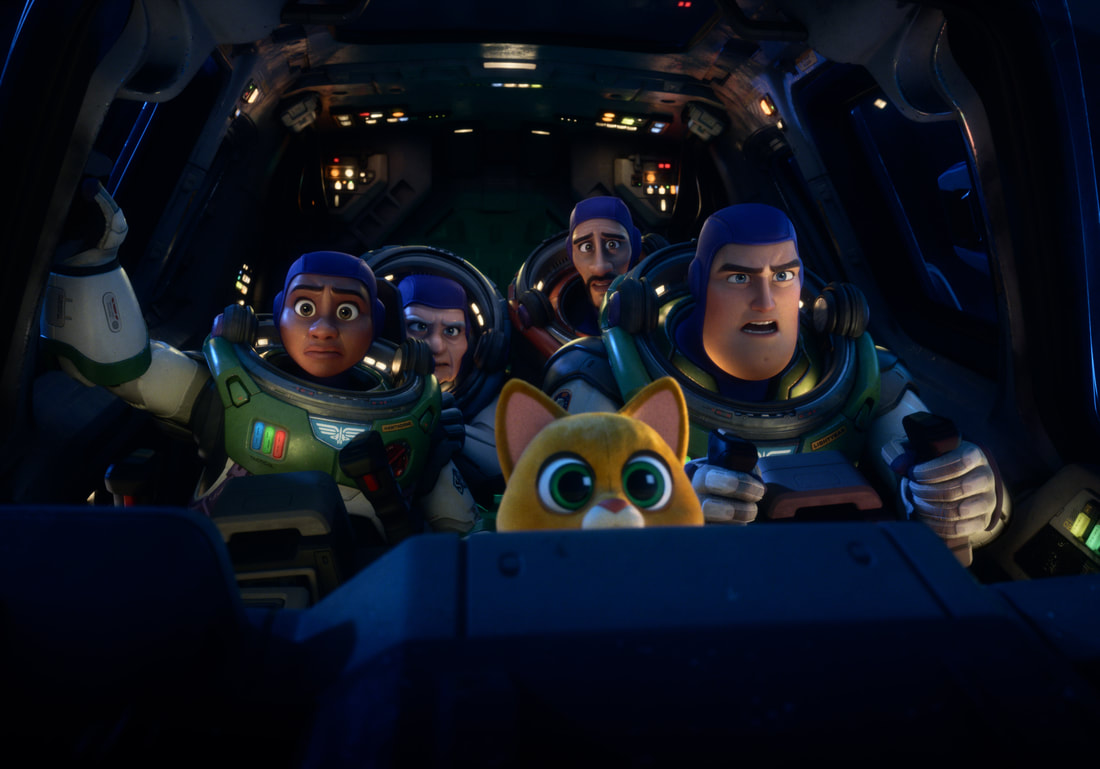
In Disney and Pixar’s “Lightyear,” Buzz (voice of Chris Evans) returns to the planet he’s been marooned on for decades after a monumental test flight. But things have changed while he was away. When he runs into Izzy Hawthorne (voice of Keke Palmer), he mistakes her for her grandmother Alisha—Buzz’s best friend and commander. Peter Sohn lends his voice to Buzz’s dutiful robot companion, Sox. Directed by Angus MacLane (co-director “Finding Dory”) and produced by Galyn Susman (“Toy Story That Time Forgot”), the sci-fi action-adventure opens in U.S. theaters on June 17, 2022. © 2022 Disney/Pixar. All Rights Reserved.
In 1995, Pixar released its first computer-animated film, Toy Story. They gained success and led on to create many sequels, merchandise, shorts, and more. The franchise was thought to have come to a close in 2019, but Pixar had one more trick up its sleeve: Lightyear. Lightyear tells the story of the actual movie that Toy Story’s Andy had loved all those years ago, leading to him receiving his Buzz Lightyear toy in the first film. In the movie, Lightyear, voiced by Chris Evans, embarks on an intergalactic adventure with a group of recruits, rookies, and a robot cat. They must find a way to stop the evil Zurg and rescue the people of the planet.
This was a great, thoroughly entertaining film. The characters were all fun and likable, especially the robot cat Sox. After seeing the trailer, it seemed as though Sox would have been a bit annoying, but he was actually the perfect amount of comedic relief and extremely helpful towards the plot. He is very comparable to the loveable Forky in Toy Story 4. Chris Evans was a perfect pick to play as Lightyear. He did a great job almost impersonating Tim Allen while also having his own spin on the space ranger. The rest of the cast was also well-chosen, and the core four of the film all had great chemistry. 
Disney and Pixar’s “Lightyear” is an all-new, original feature film that presents the definitive origin story of Buzz Lightyear (voice of Chris Evans)—the hero who inspired the toy—following the legendary Space Ranger on an intergalactic adventure. But Buzz can’t do it alone—he shares space with a dutiful robot companion cat called Sox (voice of Peter Sohn). A hidden grab bag of gizmos in a cute kitty package, Sox is Buzz’s go-to friend and sidekick. Directed by Angus MacLane (co-director “Finding Dory”) and produced by Galyn Susman (“Toy Story That Time Forgot”), the sci-fi action-adventure releases on June 17, 2022. © 2022 Disney/Pixar. All Rights Reserved.
The film was nonstop. There wasn’t a single moment of stillness. Anytime things would calm down, there was another immediate call for adventure, which was perfect. Sometimes in certain films, it can be a bit overwhelming to have one thing after the other, but Lightyear played it off perfectly: a great mix of action and silliness. The way it kicks off is also appreciated, as it isn’t something that drags on for half of the movie and everyone is sitting there still learning about the characters. You learn who Buzz is and everyone else within a matter of a few minutes, and then you’re off into adventure. The sprinkle of representation was also greatly appreciated as it was shown but not given a huge deal. It exists just like anything else, and that’s how it should be for future films, so another point for Disney. You also have to appreciate that they did not overdo it with the references to the older films. There are small links to toy Buzz, and they are handled wonderfully.
What is so great about this film is that, by its end, you genuinely understand why Andy loved Buzz so much. It’s cute and sentimental, especially if you grew up loving Toy Story, and who didn’t? Lightyear is a highly recommended film to watch. Pixar is slowly bringing itself back up by releasing great things again, and they won’t be stopping here. Watch Lightyear in theaters June 17. Rating: 4/5 |
Archives
July 2024
Authors
All
|
|
|
disappointment media
Dedicated to unique and diverse perspectives on cinema! |



